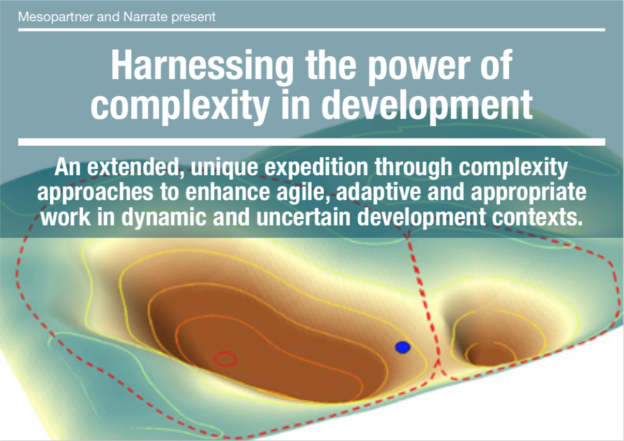I’m really excited to announce a new training course that I have put together with Tony Quinlan from Narrate, which will be starting in September. As readers of my blog know, I have applied concepts and principles of complexity to my work in international development for a long time. In this course, I will share these concepts, principles and experiences I have made and accompany the participants to make sense of their own experiences and create new experiences in applying complexity concepts.
Here the brief blurb for the course:
Harnessing the power of complexity in development – An extended, unique expedition through complexity approaches to enhance agile, adaptive and appropriate work in dynamic and uncertain development contexts.
This course gives you a unique opportunity to gain experience and expertise in complexity, through a guided journey covering the fundamentals of complexity. Projects taken from participants’ real-world situations (not hypothetical case studies) will be used to apply these principles, teams being mentored all the while by two expert practitioners.
When we started thinking about the course we knew that we did not want to develop a standard three or four day training event. During such events, trainers usually download a lot of theories, concepts, framework and tools onto the people. They then leave them alone when participants try to make sense of it all, how it relates to their own work, and how they can apply this new knowledge.
So what we have come up with is a three-months programme that combines our inputs with experiential parts where the participants will be able to apply the new ideas to concrete, real-world problems, taken from their own contexts.
There will be three face-to-face events:
- An initial, intensive three-day event (7-9 September 2018) outside London. This event that will provide participants with the key concepts, principles and frameworks, but will also allow them to start making sense what that means for their own working reality. We will emphasise sensemaking and co-creation for the step from theory to practice and allow participants to work together and form a peer-support network. We will form groups that will work on a specific project over the following few weeks.
- A mid-point, one-day event (17 October 2018) that will allow the group to reconvene and share experiences made over the last few weeks. The day will also include a guest speaker who will speak about concrete experiences made in applying ideas from complexity to development reality. The participants will conclude current coursework projects and identify new projects for the second phase.
- A final, two-day workshop (30 November – 1 December) to wrap up the course. This will be a participant-led workshop to re-cover requested topics, gather feedback and reflections on projects and celebrate the experience.
In between these events, Tony and I will mentor the participants on their projects and answer questions that pop up. We are offering 90 minutes face-to-face drop-in sessions every other week, during which we will either deepen a topic if requested by the participants or discuss questions. We will also offer participants one-to-one clinic sessions.
The first event is held at Cranfield University, outside of London. While people can commute there from London, we hope that many will stay with us and share some private time to chat, exchange stories, and get to know each other better. We believe that the best learning happens when we engage as whole people, not only professionals, and when we spend some time together to talk about different things than the specific topic. We will also use the time to combine classroom-type training with time for moving around and engage the body in the learning process.
We are very excited about this structure as we believe it will allow the participants to effectively combine conceptual/theoretical inputs with experiential learning on real-world issues. The training is aimed to be an expedition and exploration into complexity that allows for the unexpected to emerge and will be adaptive enough to accommodate for course corrections en route.
We hope that during the three months spent together, the group of participants will grow into a peer-support network that will continue to support each other after the training concludes. While we will provide the initial platform to do that, this network will essentially have to be self-organised by the participants – self-organisation obviously being a core-concept in complexity!
If you are interested in the training course, you can find more information in the PDF brochure or you can sign up on our Eventbrite page (you find all the information of the brochure there as well).
Don’t wait too long, we have an early bird offer that gives you 20% off the full price!


I have made and accompany the participants to make sense of their own experiences and create new experiences in applying complexity concepts.